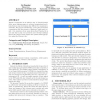196 search results - page 6 / 40 » Using historical data to enhance rank aggregation |
114
click to vote
CIKM
2008
Springer
15 years 3 months ago
2008
Springer
Learning-to-rank algorithms, which can automatically adapt ranking functions in web search, require a large volume of training data. A traditional way of generating training examp...
141
click to vote
WSDM
2012
ACM
13 years 9 months ago
2012
ACM
Many vertical search tasks such as local search focus on specific domains. The meaning of relevance in these verticals is domain-specific and usually consists of multiple well-d...
109
click to vote
KDD
2009
ACM
15 years 8 months ago
2009
ACM
Human computation is an effective way to channel human effort spent playing games to solving computational problems that are easy for humans but difficult for computers to autom...
127
click to vote
EDBT
2009
ACM
15 years 8 months ago
2009
ACM
There has been an explosion of hyperlinked data in many domains, e.g., the biological Web. Expressive query languages and effective ranking techniques are required to convert this...
JDM
2007
15 years 1 months ago
2007
We present a new method for computing temporal aggregation that uses a multidimensional index. The novelty of our method lies in mapping the start time and end time of a temporal ...

